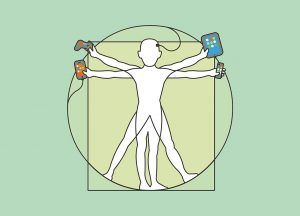Simon Makin in Nature:
 In his 1909 short story The Machine Stops, E. M. Forster imagined a future in which people live in isolation underground, their needs serviced by an all-powerful ‘machine’. Human activity consists mainly of remote communication — face-to-face interaction is frowned upon. Ultimately, the title of the story plays out: the machine stops, civilization collapses, and the future of humanity is left to the surface-dwellers who avoided dependency. The story has been lauded not only for its prescient imagining of something like our hyperconnected Internet age, but also for its insights into the human impact of an all-powerful technology. We are now starting to grapple with similar questions. What do we lose when we cede autonomy to technology? Are we becoming dependent on it? And what is digital technology doing to our minds?
In his 1909 short story The Machine Stops, E. M. Forster imagined a future in which people live in isolation underground, their needs serviced by an all-powerful ‘machine’. Human activity consists mainly of remote communication — face-to-face interaction is frowned upon. Ultimately, the title of the story plays out: the machine stops, civilization collapses, and the future of humanity is left to the surface-dwellers who avoided dependency. The story has been lauded not only for its prescient imagining of something like our hyperconnected Internet age, but also for its insights into the human impact of an all-powerful technology. We are now starting to grapple with similar questions. What do we lose when we cede autonomy to technology? Are we becoming dependent on it? And what is digital technology doing to our minds?According to Ofcom, the UK regulatory body for telecommunications, 78% of the UK population, and 95% of those aged 16–24, own a smartphone. On average, people check their phones every 12 minutes, and one in five adults spends more than 40 hours per week online. Most of this rise in connectivity has occurred in the past decade, making it one of the fastest changes society has experienced. Smartphones, social media, video games and screen time in general have been accused of impairing memory, attention and reading, and making us less sociable, civil and empathetic. To counter growing public pressure, the corporate giants driving the revolution are moving to mitigate harm and manage addiction. But some researchers say that any negative associations are small and that causal evidence is lacking — indeed, many studies have found positive effects. In the absence of clear evidence, battle lines are being drawn.
More here.
